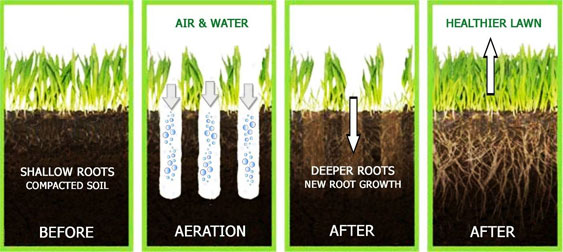
Lawn aeration is the naturally occurring process of air exchange between the soil and its surrounding atmosphere. Lawn aeration helps reduce soil compaction without excessive injury to the grass plants. Practically speaking, lawn aeration is the process of removing small plugs of thatch and soil from the lawn to improve soil aeration.
Over time a normal lawn will compact itself. A compact ground not only tends to cause thatch build-up but also greatly reduces the amount of air and nutrients that enter the ground. With less nutrients to feed on and a harder ground to break into, grass roots cant grow and often the grass itself turns into an ugly brownish-yellow color ultimately provoking thinning of the grass. If thatch is left unmanaged, it can lead to serious maintenance and pest problems. Lawn aeration can help reduce the risk of these problems occurring.
Compaction is not only provoked from walking and mowing on your lawn, but also by rain and irrigation. Compaction occurs primarily in the 1 to 1-1/2 of the soil surface. Aeration can prevent or solve compaction and thatch build-up. By using a lawn aerator, the machine creates small holes and slits in the soil, allowing a better passage of air, water and nutrients while leaving minimum damage on the ground surface. The slits created by the aerator blades will become invisible to the eye within 10 to 12 days, but the ground will have regained the needed nutrients allowing for the grass roots to grow stronger and deeper.
The benefits of lawn aeration are:
- Improves air exchange between the soil and atmosphere
- Enhances soil water uptake
- Reduces water runoff and puddling
- Improves turfgrass rooting
- Reduces soil compaction
- Enhances heat and drought stress tolerance
- Improves resiliency and cushioning
- Enhances thatch breakdown



